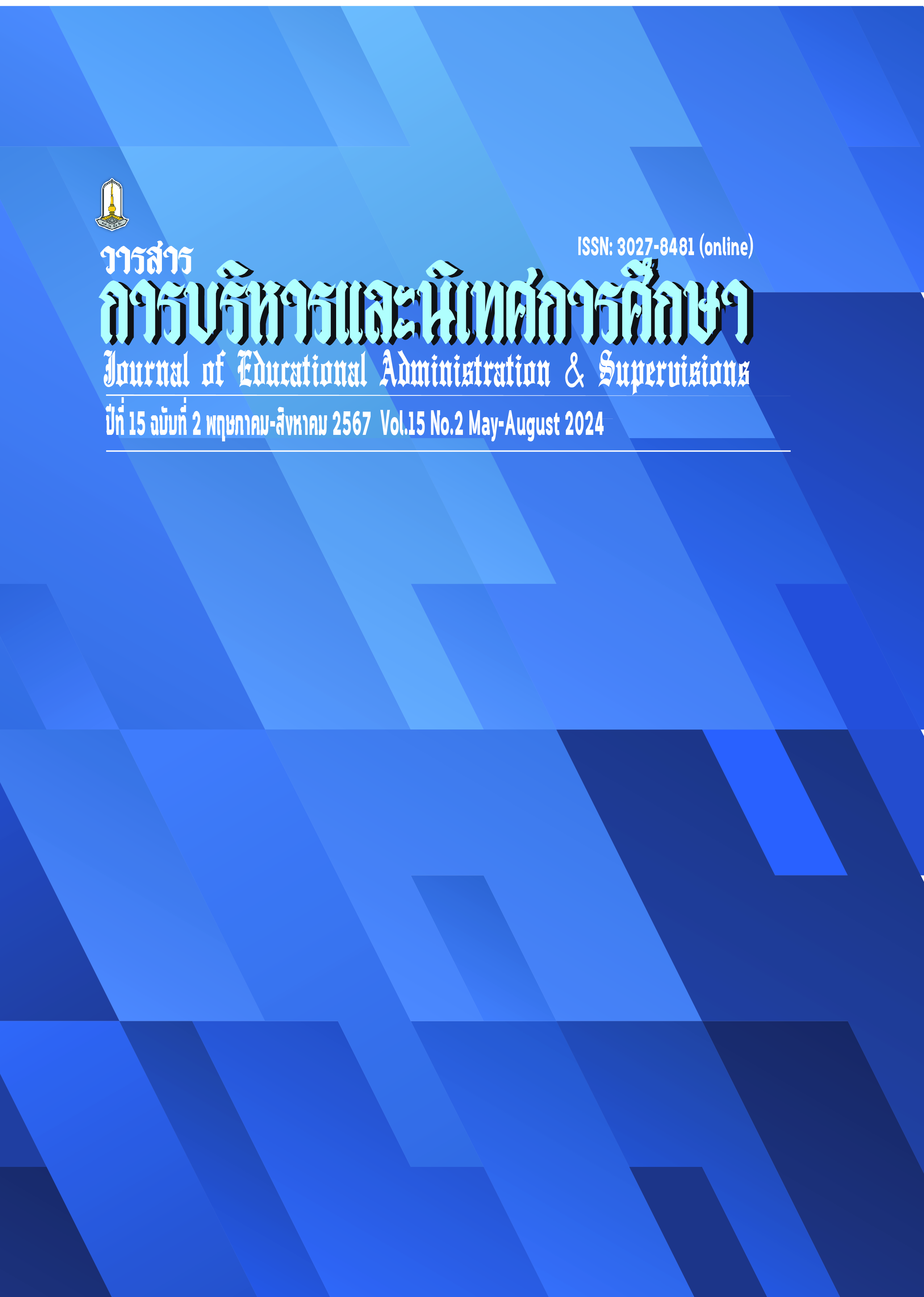The Profession Learning Community Integrating Action Research in Classroom by Phenomenon-Based Learning in Biology Subject of Grade 10th Students in Mahasarakham University Demonstration School (Secondary)
Main Article Content
Abstract
The Developing a professional learning community that integrates action research Using the Phenomenon-Based learning in Biology of Grade 10th students at Mahasarakham University Demonstration School (Secondary) has aim to 1) Create a learning community development process integrated with classroom action research 2) compare the thinking and reflection skills of students and 3) compare the knowledge and the development of students' self-learning from Phenomenon-Base learning activity. The sample was 70 grade 10th students. The research tool was the professional learning community assessment according to the Teachers Council guidelines, assessment of thinking and reflection skills, students self-assessment and a Biology comprehensive knowledge test. The statistic used t-test (independent). The results found that the development of learning communities occurred by planning teachers' learning management together and classes are held to reflect on academic results together and the Maha Sarakham University Demonstration School (Secondary Division) has the majority of PLCs at the highest level. The average comparison results the thinking and reflection skills of students in Group 1 and Group 2 were not different. The average comparison results of Biology comprehensive test scores found that student's knowledge of biology were differences statistically significant at the .05 level, with students in Group 1 having a moderate level and students in Group 2 having a high level of knowledge and average comparison results there was no difference in the development of self-learning of students in Group 1 and Group 2.
Downloads
Article Details
References
นัตยา หล้าทูนธีรกุล. (2561). เอกสารประกอบการอบรมครู [เอกสารไม่ได้ตีพิมพ์]. กลุ่มงานศึกษานิเทศก์ สำนักงานศึกษาธิการจังหวัดขอนแก่น.
บุญชม ศรีสะอาด. (2560). การวิจัยเบื้องต้น (พิมพ์ครั้งที่ 10). สุวีริยาสาส์น.
ประสาท เนืองเฉลิม. (2563). การวิจัยการเรียนการสอน (พิมพ์ครั้งที่ 4). สํานักพิมพ์ จุฬาลงกรณ์มหาวิทยาลัย.
พัชรพงษ์ เพ็งผจญ และ สกนธ์ชัย ชะนูนันท์. (2566). การจัดการเรียนรู้โดยใช้ปรากฏการณ์เป็นฐานเพื่อส่งเสริมความฉลาดรู้ด้านวิทยาศาสตร์ของนักเรียนชั้นมัธยมศึกษาปีที่ 5 เรื่อง กรด-เบส. Journal of Roi Kaensarn Academi. 8(9), 248-262.
พัชรพร บุญกิตติ, วันชัย ปลื้มภาณุภัทร และ ชาตรี ฝ่ายคําตา. (2564). การจัดการเรียนรู้แบบสอดแทรกผนวกกับการจัดการเรียนรู้โดยใช้ปัญหาเป็นฐานภายใต้กรอบแนวคิดสะเต็ม ใน(STEM-PBL) เนื้อหาเรื่องกรด-เบส เพื่อพัฒนาการคิดอย่างมีวิจารณญาณ สําหรับชั้น มัธยมศึกษา. วารสารศึกษาศาสตร์ มหาวิทยาลัยขอนแก่น, 44(4), 54-67. https://so02.tci-thaijo.org/index.php/EDKKUJ/article/view/250417
แพรวนภา เรียงริลา. (2563). การศึกษางานวิจัยที่เกี่ยวกับการสะท้อนคิด. วารสารครุศาสตร์ มหาวิทยาลัยราชภัฏเลย, 14(2), 1-13. https://so03.tci-thaijo.org/index.php/EDUCLoei/issue/view/17109
วิทยา วรพันธุ์ และ ประสาท เนืองเฉลิม. (2562). การประเมินการเรียนรู้ตามแนวทางสะเต็มศึกษาLearning Assessment for STEM Education. วารสารสถาบันวิจัยและพัฒนา มหาวิทยาลัยราชภัฏมหาสารคาม. 6(1), 419-426.
Chang, J., Faikhamta, C., Na, J. & Songม J. (2018). A comparison of science classroom environments between Korea and Thailand with a focus on their cultural features. Asia-Pacific Science Education, 4(11), 1-22. https://doi.org/10.1186/s41029-018-0028-1
Esref, A,. & Cevat E. (2021). The effect of phenomenon-based learning approach on students' metacognitive awareness. Academic Journal, Expand your Knowledge : Educational Research and Reviews, 16(5), 181-188, https://doi.org/10.5897/ERR2021.4139.
Kemmis, R., & McTaggart, S. (Eds.). (1988). The action research planner. (3rd ed.).UNSW Press.
Pasi, S,. (2019). Phenomenon Education Re-thinking from Finland, Phenomenon Based Learning Teaching by topics. http://www.phenomenaleducation.info/phenomenon-based-learning.html
Remelyn, L. A. & Lomibao, L. S. (2020). Embedding Proof-Writing in Phenomenon-based Learning to Promote Students' Mathematical Creativity. American Journal of Educational Research, 8(9), 676- 684, https://doi.org/10.12691/education-8-9-9
Tawan, C. & Kulthida N. (2021). Phenomenon-based Learning: Integrated for enhancing learners' knowledge in the real world. Journal of Graduate Studies Valaya Alongkron Rajabhat University. 15(2), 251-263.
Tissington, S. (2019). Learning with and through phenomena: An explainer on phenomenon-based learning. Paper presented at the Association of Learning Developers in Higher Education Northern Symposium, 1-8, Middlesbrough UK.
Wutthisak, B., Chowwalit C., & Prayoon W. (2021). The Development of Professional Learning Community (PLC) for Basic Education Schools in Maha Sarakham Province, Thailand. Annals of R.S.C.B., 25(5), 5579 – 5591, http://annalsofrscb.ro
Wutthisak, B. (2021). The Development Biology Authentic Learning of Mahasarakham . University Demonstration School (Secondary), Thailand. Active Learning – Theory and Practice. IntechOpen. https://www.intechopen.com/chapters/78086.
Yunita, N. F. & Endah P. (2020). An Analysis of Grade XI Students' Critical Thinking Skills on Animal Tissue Topic in SMA Negeri 1 Kota Mungkid. Journal of Biology Education. 9 (2), 139-148. http://journal.unnes.ac.id/sju/index.php/ujbeUniversitasNegeriSemarang.


